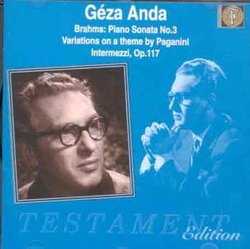| All Artists: Brahms, Anda Title: Piano Sonata 3 Members Wishing: 0 Total Copies: 0 Label: Testament UK Original Release Date: 1/1/1953 Re-Release Date: 6/10/1996 Album Type: Import Genre: Classical Styles: Forms & Genres, Sonatas, Historical Periods, Romantic (c.1820-1910) Number of Discs: 1 SwapaCD Credits: 1 UPC: 749677106829 |
Search - Brahms, Anda :: Piano Sonata 3
CD Details |
CD ReviewsA portrait of the virtuoso as a young man Anton Zimmerling | Moscow, Russia | 01/09/2009 (5 out of 5 stars) "The Hungarian-born pianist Géza Anda (1921-1976) was a virtuoso of a special type, who did not play a great deal of romantic works that suited his fingers and could increase his popularity. His most known CD is 3 Bartok's piano concertos with the great Ferenc Fricsay at the podium (rec. 1959-1960 for Deutsche Grammophone (DG 447 399-2) Bartok: The Piano Concertos / Anda, Fricsay, Radio Symphony Orchestra Berlin, but his best solo recordings were made for the EMI in the mid-1950s. They are now issued on the Testament label in excellent transfers.
Anda had a beautiful touch nourished by him, and a highly individual technics. His ff is not the largest in the world, but he played in a dynamic diapason, where every note was clearly audible. His music refinement and taste were astonishing: over the usual rubato, Anda possessed a capacity to change the rhythmic pattern without distorting music structure. Perhaps it was for this unique capacity, Wilhelm Furtwängler dubbed Anda a `piano troubadour'. Certainly, such a pianist needed a special repertory to display his talents: Anda, was, indeed, very selective and refrained from most classical sonatas by Beethoven and Mozart, but championed Schumann's Carnaval, Symphonic etudes Schumann: Carnaval; Études symphoniques; Kreisleriana, the Davidsbündler Dances Troubadour of the Piano [Box Set], Brahms's Paganini variations, Liszt's and Bartok's music Liszt: Piano Sonata; Mephisto Walz No. 1; Un sospiro; La campanella; Béla Bartók: Sonatina; Léo Delibes: Valse lent, Chopin's Preludes and Etudes, Op. 25 Chopin: Piano Concerto No. 1; 12 Études; Ballade No. 1, and selected pieces by late Romantics. I cannot say, what catches me more in Anda's playing: his fleet fingers, individual accents he makes elsewhere, or his hypersensitive ear. Perhaps a combination of all this, especially in such stunning recordings as Brahms' Paganini-Variations (rec. 1953). It is my favorite post-war version. Some people, as Bryce Morrison, who provided the liner notes to this CD and the whole Anda series on Testament, would possibly claim that it is the best version all way round, but my all-time favorite is Backhaus 1929 (available on Music & Arts - see my review), and I cannot escape a comparison. Anda's account is less demonic and powerful than Backhaus'; it is rather understated than threatening or stormy. Nevertheless, it is a thrilling performance, and a listener is anticipating every new variation with a breathless expectation. That is the top secret: if a pianist starts singling out isolated variations in a self-admiring manner, the vision of the whole gets lost. I am not reproducing the comments of Bryce Morrison's to particular variations, but I think they are appropriate. Anda's tempi are fast (22'04), though Backhaus played the Paganini for wild [16'32]: both Anda and Backhaus cut Var. 14 in Book I and omit the repeat of the Theme in the beginning of Book II, but make no other cuts. In a live recital taken in Edinburgh in 1955 (available on BBCL 4135 Beethoven: Piano Sonata No. 7; Schumann: Études symphoniques; Brahms: Variations on a Theme by Paganini; Bartók: Pian) Anda attempted to ran after Backhaus and played it faster than here (at 18'14): he almost overhauled Egon Petri 1937 with his [18'02] (available on Naxos - see my review Brahms/Paganini/Handel: Varia), but with mixed results. Regardless at one thinks of that live recital, this 1953 studio version placed on the reviewed CD is note-perfect and exciting. True `Brahmins' should be happy to find one more great performance of Brahms' F minor sonata, Op. 5 (1957). For those, who wish to look for other great approaches to this sonata, I recommend Edwin Fischer (available on Andante Edwin Fischer, Piano), a pianist whom Anda held in high esteem. His own recording differs from Fischer's and has more broad and flexible tempi. I suspect that Anda was better suited for a free variation form, rondos, scherzos, rhapsodies, than for a classical sonata form. Anyway, the three last movements are a greater success than the first two ones: the climax of the 2nd movt is calculated rather than heart-felt. But the Scherzo is terrific and Anda's rhythmic inflexions in its difficult cadence are exciting. The mournful Intermezzo (it is a short Marcia funebre in C minor) is one of the best on record: however, the best version I heard is from Elly Ney 1961 (Colosseum Classics COL 9025-12.2), a pianist, who did not play other movements of Brahms' F minor sonata that perfect. The three Intermezzi, Op. 117 (1957) are the weakest items on this CD: Anda's playing here suffers from excessive pedaling (which is absolutely not the case in Brahms's sonata and Paganini-variations), and his phrasing is unnatural. He recorded them on December 18 & 19, 1957, partly during the same session as the F minor sonata (December 16-18, 1957). This strengthens my suspicions that pianists who champion larger Brahms' works, do not always excel in Brahms' intermezzi, and vice versa. A similar story was with Backhaus, who unwisely combined intermezzi with larger pieces during the same recording sessions. Even great masters need some time to adjust to the style of Brahms' miniatures. Anyway, it is not Anda's intermezzi, you are buying this CD for, but Anda's Paganini-variations and Anda's F minor sonata. The overall timing of the CD is [71'52'']. Heartily recommended. Don't miss other issues in this Anda series on Testament! Anton Zimmerling " |

